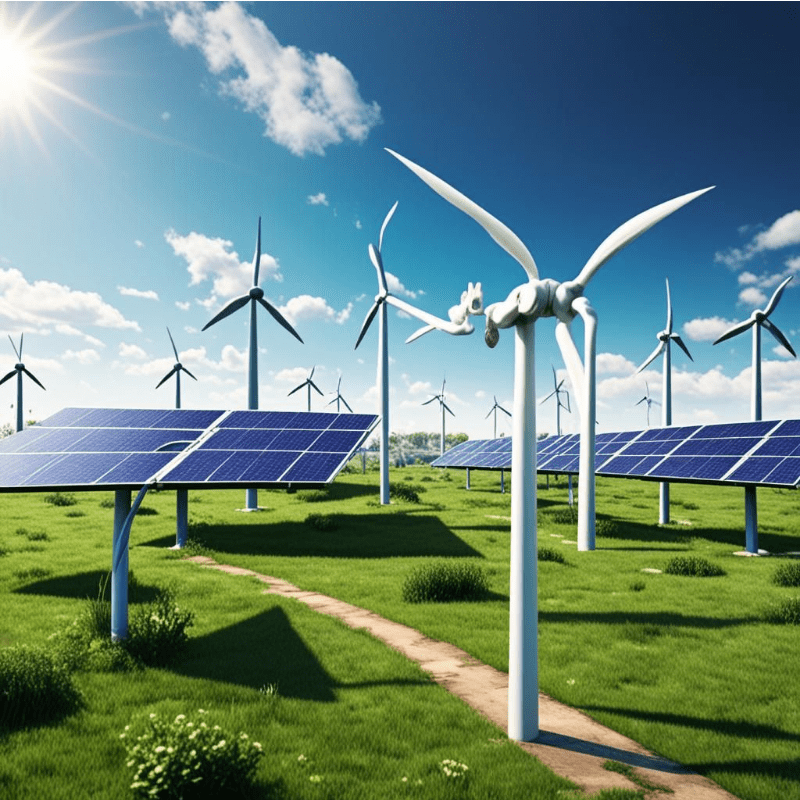renewable energy optimization
The global push towards sustainability has driven innovations across numerous industries, with artificial intelligence (AI) playing a pivotal role in reshaping clean technologies (clean tech). As companies strive to lower their carbon footprints, AI emerges as a powerful tool that enhances energy efficiency, optimizes resource management, and accelerates the adoption of renewable energy solutions. In this article, we will explore how AI is revolutionizing the clean tech sector and the potential it holds for a greener future.
1. AI-Driven Energy Efficiency
AI is at the forefront of transforming how we consume energy. Smart grids powered by AI can predict energy demand, identify potential inefficiencies, and optimize energy distribution. AI’s ability to analyze vast amounts of data in real time allows utility companies to adjust power supplies dynamically, reducing energy waste and enhancing reliability.
For example, AI-powered predictive models can forecast weather conditions and adjust the output of renewable energy sources like solar and wind farms. This not only ensures maximum energy generation but also minimizes the need for non-renewable backups. Google’s AI subsidiary, DeepMind, has already demonstrated this by improving the energy efficiency of data centers, resulting in a 15% reduction in energy usage
AI in Clean Tech: Revolutionizing Energy Efficiency and Sustainability
The global push towards sustainability has driven innovations across numerous industries, with artificial intelligence (AI) playing a pivotal role in reshaping clean technologies (clean tech). As companies strive to lower their carbon footprints, AI emerges as a powerful tool that enhances energy efficiency, optimizes resource management, and accelerates the adoption of renewable energy solutions. In this article, we will explore how AI is revolutionizing the clean tech sector and the potential it holds for a greener future.
1. AI-Driven Energy Efficiency
AI is at the forefront of transforming how we consume energy. Smart grids powered by AI can predict energy demand, identify potential inefficiencies, and optimize energy distribution. AI’s ability to analyze vast amounts of data in real time allows utility companies to adjust power supplies dynamically, reducing energy waste and enhancing reliability.
For example, AI-powered predictive models can forecast weather conditions and adjust the output of renewable energy sources like solar and wind farms. This not only ensures maximum energy generation but also minimizes the need for non-renewable backups. Google’s AI subsidiary, DeepMind, has already demonstrated this by improving the energy efficiency of data centers, resulting in a 15% reduction in energy usage
2. AI Optimizing Renewable Energy
Renewable energy sources, such as solar, wind, and hydro, are inherently variable. AI helps by optimizing energy storage and balancing the intermittent nature of these sources. For instance, machine learning algorithms can analyze patterns in renewable energy production and consumption, offering better integration of renewables into the grid.
Startups like CarbonQuest are harnessing AI to manage carbon capture, which extracts CO2 from industrial emissions. By using AI to analyze emissions data and optimize carbon capture techniques, these companies are enabling industries to lower their carbon footprints while making the technology scalable and more efficient.
3. AI for Energy Storage Management
One of the critical challenges of renewable energy is the management of energy storage. Batteries that store excess energy for later use are essential to ensure a steady power supply. AI helps manage these storage systems by predicting usage patterns, preventing overcharging, and maximizing battery lifespan.
For instance, AI algorithms can determine the optimal times to charge and discharge batteries, ensuring that energy is available during peak demand times. This not only stabilizes the energy supply but also extends the life of energy storage systems, making renewable energy solutions more sustainable.
4. AI-Enhanced Carbon Capture and Reduction
AI is being used to innovate carbon capture technology, making it more efficient and cost-effective. AI can optimize the chemical processes involved in capturing and storing carbon emissions, while also identifying the best locations for carbon storage based on geological data.
Additionally, AI-powered systems can monitor and adjust processes in real time, ensuring that carbon capture facilities operate at peak efficiency. Companies like CarbonQuest are working with AI to scale carbon capture technology, which is vital for reducing industrial emissions and combating climate change.
5. The Role of AI in Energy Policy and Urban Planning
Beyond direct energy applications, AI is also shaping policy and urban development. Cities are increasingly relying on AI-driven analytics to design energy-efficient infrastructure and smart cities. AI helps policymakers understand the long-term impacts of various clean tech solutions, enabling them to make data-driven decisions that benefit both the economy and the environment.
AI’s ability to simulate different scenarios, from energy consumption to urban heat islands, helps cities plan for a more sustainable future. This has direct implications for reducing greenhouse gas emissions and meeting global climate goals.
6. AI’s Future in Clean Tech
As AI continues to evolve, its applications in clean tech are expanding. From AI-powered wind turbines that adjust their positioning for optimal energy generation to smart homes that reduce energy waste, the potential of AI in clean tech is immense.
One of the future trends is the integration of AI with blockchain for decentralized energy trading systems. This would allow individuals and businesses to buy and sell renewable energy, promoting local energy generation and reducing dependency on large-scale power plants.
Conclusion
AI is rapidly becoming a cornerstone of clean tech innovation. By enhancing energy efficiency, optimizing renewable energy usage, and facilitating carbon reduction, AI is driving the transition to a more sustainable future. As more companies and governments adopt AI-powered solutions, the potential to significantly lower global emissions and combat climate change grows exponentially. Embracing these technologies will be key to achieving a cleaner, greener world.
